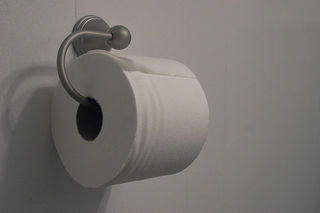Fear
What Toilet Paper Means
Ghostbusters, Dr. Moreau, and the Fear of Chaos
Posted March 19, 2020 Reviewed by Matt Huston
When it became clear that COVID-19 was a global pandemic, I looked online at the Berliner Zeitung, since I live part of the time in Berlin. I confronted a picture of a frantic man wheeling a shopping cart full of toilet paper. “Hamsterkauf!” cried the headline, a German expression meaning panic-buying, as hamsters stuff their cheeks with food. I laughed. Toilet paper? Then I saw the white, empty deserts of the Atlanta paper goods aisles.

Facing weeks of quarantine, why would people buy toilet paper? I would like to offer a hypothesis. For people who rely on disposable paper to clean themselves, lacking toilet paper threatens their humanity. It challenges the illusory human-animal boundary, and the artificial line between culture and nature. Loss of toilet paper points toward the dissolution of ALL boundaries, the apocalypse Bill Murray described in Ghostbusters as “Human sacrifice, dogs and cats living together, mass hysteria!” (Reitman). Germans would call it “alles durcheinander,” a mess in which everything is lying around everywhere, indiscriminately mixed with everything else. What people fear is civic breakdown, cultural dissolution, loss of order. Toilet paper defends us against all that.
Some analysts have explained the run on toilet paper through behavioral economics and game theory (Baddeley, Veit). No doubt we’re influenced by what others are buying, but I sense a deeper cause. In 1966, anthropologist Mary Douglas published Purity and Danger, a cross-cultural study of how people define cleanliness and dirt. According to Douglas, “… dirt is essentially disorder. There is no such thing as absolute dirt: it exists in the eye of the beholder. … Dirt offends against order (Douglas 2). Members of a culture pressure each other to behave according to rules built on underlying notions of dirt and cleanliness (Douglas 4). By studying how people define filth, one can learn a lot about a culture. In Douglas’s words, “reflection on dirt involves reflection on the relation of order to disorder, being to non-being, form to formlessness, life to death” (Douglas 7).
We humans vary in the ways we clean ourselves. Some prefer washing to wiping, but just about everywhere, cleaning matters. Across cultures, accusing people of being dirty—however “dirty” is defined—is a classic way to shame them or to exclude them from a group. Losing access to the culturally prescribed way to clean oneself can make a person feel ashamed, unworthy, maybe even inhuman.
No one has challenged the flimsy animal-human border more daringly than H. G. Wells in The Island of Dr. Moreau (1896). In Wells’s novella, a rogue scientist tries to convert animals to humans through painful surgeries and cruel brainwashing. Readers encounter the results of Moreau’s experiments through reports from the none-too-capable narrator, Prendick. On a remote Pacific island, Moreau’s “beast-folk” improvise shelter and live together, but Prendick’s nose makes him doubt their capacities. On the way into the beast-folk’s ravine, he notices “lumps of decaying fruit pulp and other refuse which accounted for the disagreeable stench of the place” (Wells 41). At first, Prendick thinks Moreau is turning people to animals—the opposite is too hard to imagine. Prendick’s references to “other refuse” and “the nearly intolerable closeness of the den” (42) show his sense of the beast-folk’s dirtiness. How can they be human if their home smells this bad?
Wells leaves it to the reader to decide whether there is any difference between humans and animals. Moreau knows his beast-folk are reverting, despite his attempts to burn out their instincts with fear. Whatever makes a living creature human remains elusive. As Prendick starts to sympathize with the beast-folk, readers may suspect that The Island of Dr. Moreau is about more than one man’s experiments. Watching the beast-folk suffer, Prendick thinks:
“A series of propositions called the Law … battled in their minds with the deep-seated, ever rebellious cravings of their animal natures. …. Before they had been beasts, their instincts fitly adapted to their surroundings, and happy as living things may be. Now they stumbled in the shackles of humanity, lived in a fear that never died, fretted by a law they could not understand” (Wells 61, 74).
The Island of Dr. Moreau may be about all human beings, who evolved from other animals and every day face conflicts between cultural laws and their instinctive drives. Some of these laws dictate how to keep clean. If we are beast-folk, losing our toilet paper could mean reverting just as Moreau’s unstable hybrids did.
If we fear the collapse of culture and civic order, there are better ways to respond than hoarding toilet paper. The ability to clean ourselves as our cultures demand will unavoidably shape our sense of humanity. But respect for our fellow humans—awareness of their feelings, ideas, dignity, and pains—means so much more. If toilet paper runs out, we can wash. Not too long ago, Sears Roebuck catalog pages served people in privies. There is no substitute for kindness. Fixation on a symbol of human culture is blocking our vision of human needs.
References
Baddeley, M. C. (2020). “Toilet Paper Mania: How Behavioral Economics Can Explain Why People Are Stockpiling Toilet Paper.” Psychology Today Blog.
Douglas, M. (2002). [1966] Purity and Danger: An Analysis of Concepts of Pollution and Taboo. London; New York; Routledge; Taylor & Francis.
Reitman, I. (1984). Ghostbusters. Columbia-Delphi and Black Rhino Productions.
Veit, W. (2020). “Why Toilet Paper? Current Research in Economics and Psychology Explains the Violence and Hysteria.” Psychology Today Blog.
Wells, H. G. (1996). [1896]. The Island of Dr. Moreau. Mineola, NY: Dover Publications.


